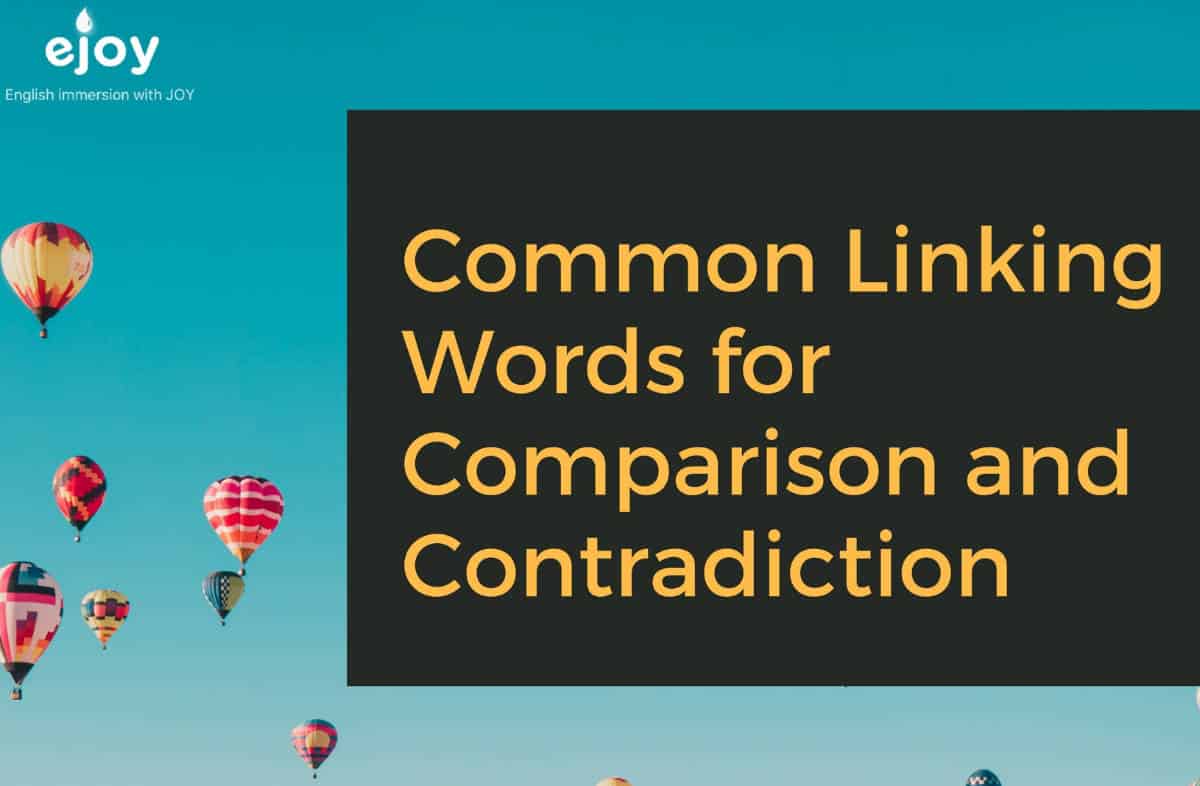Linking words ( or transitional words, conjunctions) are words or phrases that connect ideas or sentences within a text. Using linking words helps your text more readable and allows the reader to comprehend the opinion or information you’re representing. In this post, we’re going to learn some useful linking words for comparison and contradiction.
1. But
But is coordinating conjunction used to connect contrasting ideas. Coordinating conjunctions connect items that are the same grammatical type.
For example:
- She always wants to be successful but she is so lazy.
- I’m not sure what you are planning to do but I will always support you.
2. However
However, is more formal than but. You can use however at the beginning of a sentence, yet you can’t use but at the beginning of a sentence (in written English).
For example:
- We have failed many times; however, we still keep trying.
- I want to come to your party tonight. However, I have to visit my parents. (In case you use but, the sentence should be: “I want to come to your party tonight but I have to visit my parents.”)
3. Nevertheless
We can use either however or nevertheless to indicate the second point we wish to make contrasts with the first point. The difference is that nevertheless is a bit more formal and emphatic than however.
For example:
- Milos said his English is terrible. Nevertheless, he got an 8.0 on his IELTS Writing test.
- I knew a lot about the subject already, but his presentation was interesting nevertheless.
Pro tip: For those who are more likely to use smartphones, eJOY English App 2 is a great app for learning English with step-by-step courses generated from authentic videos. You can easily learn and apply not only the common linking words but also phrases and expressions that natives use every day.

4. Although / even though
These linking words are the same, and they are both followed by a clause (subject + verb). Even though is stronger, more emphatic than although.
Besides, even though is used when the given condition is negative but the outcome/result is positive.
For example:
- Even though Ram hadn’t studied, he passed the exam.
- She still loves him, even though he treated her very badly.
On the other hand, although is used when the given condition is positive while the outcome/result is negative.
For example:
- Although Ram had studied very hard, he did not score well.
- Although he’s trying to be more healthy, he finds it easier to eat fast food.
5. Despite /in spite of
In spite of and despite having a similar meaning to although or even though. They both are more common in writing than speaking and are used to show a contrast between two things. They are both more common in writing than in speaking. These two prepositional expressions are followed by nouns or gerunds (verb + ‘ing’). They are not followed by clauses (subject + verb). Despite is a little more formal than in spite of.
For example:
- Despite being one of the most successful people in the world, Mike has never felt happy.
- In spite of studying hard, Mike didn’t get a good grade on the final exam.
If you want to use a clause with despite and in spite of, you need to add the fact that.
For example:
- Despite the fact that Mike is one of the most successful people in the world, he has never felt happy.
- In spite of the fact that Mike studied hard, he didn’t get a good grade on the final exam.
6. While / Whereas
We use the conjunctions whereas and while to indicate a contrast between two facts or ideas in one sentence. These words can be placed at the beginning of the sentence or in the middle.
For example:
- While I accept that she’s not perfect in many respects, I do actually like her.
- He must be about 60, whereas his wife looks about 30.
- She likes going to parties whereas I prefer somewhere quiet.
7. On the other hand
You use on the other hand to introduce the second of two contrasting points, facts, or ways of looking at something.
For example:
- She lacked experience, but on the other hand, she was hard-working and willing to learn.
8. Yet
Yet as a conjunction means ‘but’ or ‘nevertheless‘. We use it to show contrast. It often occurs after ‘and’.
For example:
- So many questions and yet so few answers.
- It’s hard to stay focused. And yet, we know we’ll only do our best work if we stay focused.
9. By contrast / In contrast
These two conjunctions are exactly the same and are used in a similar way to however or on the other hand to introduce a contrast or a comparison. Put By / In contrast at the beginning of a sentence, with a comma (,) after contrast.
Example
- Unemployment rose in the UK. By contrast, the number of unemployed people in Canada fell.
10. On the contrary
We use “on the contrary” to deny that something is true and to explain that the opposite is true.
For example:
– Mike: “You didn’t like the movie, did you?”
– Lauren: “On the contrary, the movie was great. I think I’ll watch it again.”
So far, you’ve just learned some of the most common linking words for comparison and contradiction. Now it’s time to put them into practice. Don’t forget to check out our post about linking words for adding information to improve your writing!
And now, make a sentence with one of those linking words and share it with us in the comments below.
>>> Learn more linking words to perfect your English writing here!I also recommend you use eJOY Extension to search for more linking words meaning while reading. It is handy, instant, and helps enrich your vocabulary. You can also use the Say it features to learn how to use such linking words in a real-life context.

Download eJOY Extension for FREE













